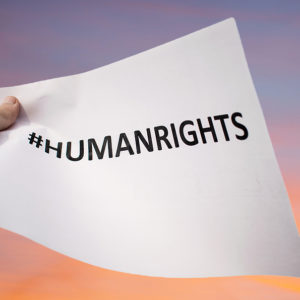At the turn of the 21st century, much of the world feared computers around the world would crash, setting off all kinds of millennial chaos. It didn’t happen. Clocks continued to tick; computers continued to run.
For the United Nations, perhaps the time was right for another chance to rid the world of racism, end slavery, and sex trafficking of women and children. Perhaps it was time to conquer famine and disease. In 2001, planning for the World Conference against Racism, Racial Discrimination, Xenophobia and Related Intolerance took shape. The site for this noble, if not symbolic event, was Durban, a location on the southern coast of Africa, a continent racked by all of the above problems.
As often happens with the United Nations, a space built on visions of peace, the event aimed at fighting humanity’s millennia-old maladies would devolve into a hatefest. Durban, instead, would become a battleground against an ancient people who’d build an identity from receiving a divine code of human behavior and entering a sliver of real estate bordering the Mediterranean. Four days into the event, the United States and Israel withdrew their delegations in protest.
Twenty years after Durban, the very United Nations that organized and promoted the original Durban Conference announced another round of fighting human rights and racism. Fast-forward 20 years into the 21st century. Something called the “Durban Declaration and Programme of Action” (DDPA) is planned to offer “discussions” that will become a report to be presented to the U.N. General Assembly at its 76th session in 2021 and the Human Rights Council’s 45th session. Can’t wait. And neither can Iran.
The representative of Iran requested that on the eve of the 20th anniversary of the DDPA, the Intergovernmental Working Group would “address the wide range of issues addressed in the DDPA, as well as the new manifestations of discrimination,” in particular issues of “xenophobia and Islamophobia.” So full of irony is this request from one of the chief violators of human rights in the world that one can only wonder if such a request from this member-nation makes the entire event a nonstarter, at least for the United States and Israel.
Other nations have requested that the 20th anniversary of Durban be celebrated with “one thematic event” in Geneva and one “high-level political event” in New York. Other groups requested producing promotional materials and “high visibility” from such countries as South Africa and Cuba, among others. Much, if not all, of the free world must wonder if the phrase “well-intentioned” has a chance to be relevant here. What’s more, the plans call for member states, intergovernmental organizations and non-governmental organizations, of which B’nai B’rith International is so credentialed, to organize and participate in the Durban 20th anniversary programs.
The framework for this meeting is beginning to sound awfully like something the world has already witnessed in the first Durban Conference. Are we headed for Durban déjà vu—another hatefest?
When the governments of Iran, Cuba and South Africa figure prominently in the planning, it’s reasonable to feel skepticism. Will the funds budgeted for this conference perpetuate United Nations bias against Israel? This funding could surely be better spent on reducing famine and sickness.
What else would make such a conference fruitful? Dream about these developments: the U.N. conference opens with a salute to Gulf States and other countries seeking peace and normalized relations with Israel. The Palestinian Authority declares the end of its covenant to destroy the State of Israel. Gone is the drumbeat of language declaring Israel an “apartheid state.” A new Palestinian government replaces its covenant and ceases uttering the refrain about how Israel targets innocent children and stops claiming the Temple Mount and the Western Wall have no attachment to the Jewish people. Imagine the progress in such a world. Nice dream. (Snap) Wake up.
Twenty years ago, while people from the free world were packing for Durban, pre-conference documents assailed Israel for “the racist practices of Zionism.” In 2021, contrary to popular belief, many in the world understand and appreciate positive contributions of Muslims and their faith in God. At the same time, no one can honestly deny Islamophobia or xenophobia of any kind, particularly when significant parts of the world live with extremist threats to kill other people, destroy other faiths or cultures and “annihilate” Israel.
Twenty years ago, delegations condemned Israel for her “treatment of Palestinians” in defending her borders. Never mind the relentless terror directed at Israel, the tunneling, kidnappings, stabbings of civilians, the firing missiles at Israeli towns from Gaza homes, schools, hospitals, even mosques.
The DDPA should try again to promote racial reconciliation, to construct a message of peace and harmony and do what the United Nations was designed to do since 1945 — “to prevent conflict, to help parties in conflict to make peace or to create conditions to allow peace to hold and flourish.” Avoid Durban Déjà vu.

